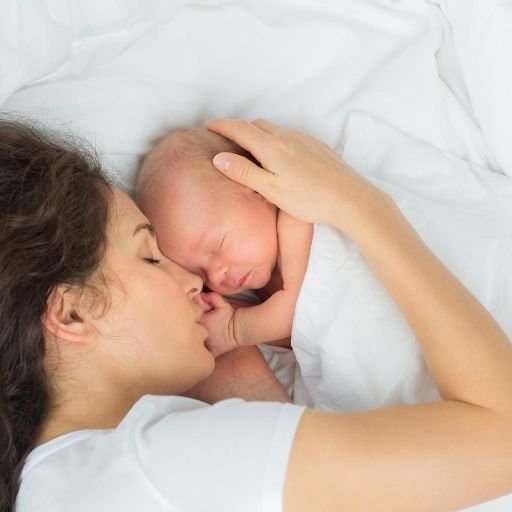Sweating - Postpartum Night Sweats
Postpartum night sweats are all about waking up hot and sweaty in the middle of the night. Some women sweat so excessively that they wake up with drenched pyjamas and bedding. Postpartum sweats often occur during the first few weeks after giving birth and are medically termed as hyperhidrosis. In general, more excessive sweating occurs during the night, hence the term night sweats. However, some women also experience heavy sweating during the day time.
It was whilst meeting up with other new mothers and bringing up the subject, that I realised I wasn’t the only one sweating out buckets. I had simply assumed it was due to milk production causing my body to overheat during the night. I woke up many times with literally pools of sweat above my boobs or between my boobs and my belly.

Sweating at Night after Giving Birth Keeping You Awake?
Waking up at night, drenched in pools of sweat is not fun or sexy. Plus excessive sweat is probably ruining your mattress.
If you can cool your night sweats, you can fall asleep faster and wake up refreshed. Meaning you feel so much better during the day and have a clearer head for looking after your newborn baby.
Are Night Sweats Normal Postpartum?
Postpartum night sweats are a common postpartum symptom. According to a study conducted by Medical News Today, 35% of the women studied reported that they experienced excessive sweating in the night postpartum. Sweating heavily postpartum is generally a short term phase, you’ll be glad to know! Sweating is simply a reaction or byproduct to a short term hormonal imbalance and symptoms should settle down again after a few weeks.
What Causes Postpartum Night Sweats?
- Doctors put it down to the fluctuation of estrogen hormone levels and the body regulating itself. According to an article by Emily Shiffer, doctors compare low levels of estrogen as similar to menopausal symptoms. Heavy night sweats are a common menopausal symptom.
- Decreasing blood volume. During pregnancy our blood volume increases by up to 50% (according to the American Pregnancy Association). Dr. Amos suggests that postpartum sweats are caused by the body shedding extra fluid which was retained during pregnancy.
- Breastfeeding can also produce symptoms similar to menopausal sweating. During breastfeeding estrogen production is suppressed. According to an article on shape.com, Dr. Hart, explains that the hormone responsible for milk production also serves to suppress the production of estrogen. Check out my page on Milk as Contraception for more information around this topic.
Recommendations for Easing Excessive Sweating Symptoms
- Change your bedding for sheets and covers made out of 100% natural fabrics such as cotton or linen. Natural fabrics are breathable whereas man made fabrics are less and therefore natural fabrics help your skin to breath and cool down naturally, reducing night sweats.
- Put extra layers of pillow cases (ensuring, again that they are made from natural fabrics) on your pillows, to save your pillow stuffing from soaking up too much sweat.
- Protect your mattress and pillow with waterproof mattress and pillow covers (you’ll need one for your mattress anyway when your toddler stops wearing nappies). Make sure it is also made of natural textiles.
- Wear natural, lightweight textile pyjamas – made out of cotton or silk – a great idea for a baby shower gift for mama.
- Place a towel underneath you whilst sleeping, to absorb sweat.
- Before going to bed, pat a natural non-talc baby powder on to your skin, in the more sweat prone areas, to help soak up sweat directly from your skin.
- Excessive sweating could lead to dehydration therefore be sure to drink enough water to replace lost fluids.
Contact you doctor if you experience fever or chills connected with sweating as this may be a sign of something more serious.
